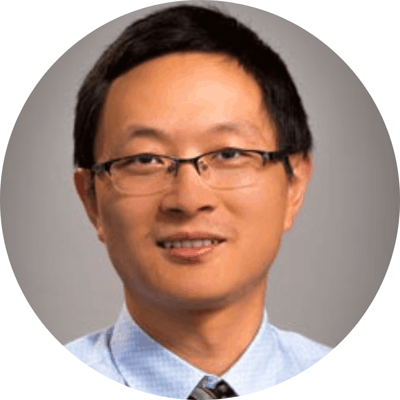LEAD Reverse Mentoring Pairs
Xiang Xue and David Burgess
Xiang Xue, PhD, Mentor
 Xiang Xue is an assistant professor in the Department of Biochemistry and Molecular Biology at the University of New Mexico. He has published 60 peer-reviewed papers and has been continuously supported by grants from several universities, foundations, and the National Institutes of Health since 2013. His research focuses on understanding the role of hypoxia signaling and mitochondrial metabolism in health and disease, especially colorectal cancer. He has worked with many historically excluded students, including Black, Native Americans, Hispanics, and women.
Xiang Xue is an assistant professor in the Department of Biochemistry and Molecular Biology at the University of New Mexico. He has published 60 peer-reviewed papers and has been continuously supported by grants from several universities, foundations, and the National Institutes of Health since 2013. His research focuses on understanding the role of hypoxia signaling and mitochondrial metabolism in health and disease, especially colorectal cancer. He has worked with many historically excluded students, including Black, Native Americans, Hispanics, and women.
Why is mentoring important to you?
Xue: There are many reasons, but I can't agree more with the following few statements.
- Being a mentor boosts interpersonal skills. Your interactions with a mentee offer numerous opportunities to practice and build interpersonal skills, such as communication, active listening, empathy, and patience. Communication is especially essential to mentorship, as you may meet regularly to discuss the mentee's goals, ideas, or concerns and provide instructions or advice. Beyond mentorship, having strong interpersonal skills can help you develop relationships and collaborate more effectively.
- Being a mentor establishes leadership skills. A mentor is a leadership position because you work directly with someone to guide them on professional development. Through your instruction, they hopefully gain useful skills or advance their career. Leadership skills are valuable for any profession or role, so this experience proves that you can manage others effectively toward specific goals. You can use this experience to help advance your career.
- Being a mentor serves as a learning opportunity. You teach and advise your mentee, but you can also learn something from them. If you and your mentee come from different backgrounds, they can teach you about things you have never experienced before. Even when you have more experience in the industry, the mentee may have insights into the latest trends or practices. For example, if your mentee is young and more technologically skilled, they can teach you how to use new software.
- Being a mentor provides a sense of fulfillment. Beyond providing you recognition or other external benefits, mentorship can offer inner fulfillment. Knowing that you made a positive impact on someone's life or career can make you feel good. If you received mentorship early in your career, serving as one can offer an opportunity to pay it forward. And one day, you may serve as inspiration for your mentee to do the same for someone else.
- Being a mentor offers self-reflection opportunities. Mentorship lets you think about and share your experiences. While assessing your positive and negative experiences, you may discover lessons that benefit both the mentee and you. Being a mentor may also remind you of what you enjoy about your profession, which can help you feel more engaged at work. Or, if you realize you are unhappy about some things, you can think about ways to improve the situation.
What do you seek to gain as a Reverse Mentor?
Xue: This is a unique program that I haven't experienced before. But I believe many of the above statements still apply to this reverse mentor/reverse mentee relationship. So as a reverse mentor, I seek to gain from my reverse mentee's wealth of experience by learning new interpersonal, leadership, and management skills, which I can integrate into my work process. By working with someone from a different generation, I can learn new ways of thinking and challenge myself to come up with fresh ideas. I am sure this program can also help me to gain some new perspectives, build my strengths, reduce my weaknesses, improve team member engagement, and develop a more open-minded and innovative approach to advance my work.
Xiang Xue is a member of American Physiological Society, a FASEB member society.
David Burgess, PhD, Mentee
 A professor of biology at Boston College, Burgess' research interests include cytokinesis and polarization of the cytoskeleton. He is a past president of the Society for the Advancement of Hispanics/Chicanos and Native Americans in Science.
A professor of biology at Boston College, Burgess' research interests include cytokinesis and polarization of the cytoskeleton. He is a past president of the Society for the Advancement of Hispanics/Chicanos and Native Americans in Science.
Why is mentoring important to you?
Burgess: Mentoring provides an opportunity to include knowledge and wise council from a respected, unbiased person with greater experience in one's personal and professional life. For me, there is also huge importance to having a respected and successful role model. Role models who have provided me with mentoring have enabled me to be more successful in my career.
What do you seek to gain as a reverse mentee?
Burgess: I hope to learn new strategies on how best to be a successful mentor and, as a senior scientist, a real opportunity to learn from a junior colleague.
David Burgess is a member of Society for Developmental Biology, a FASEB member society.